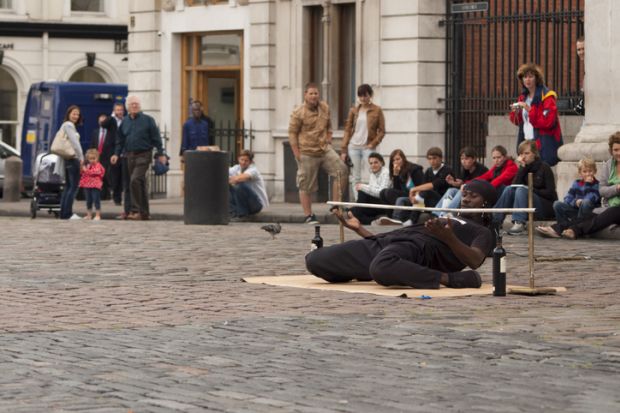Vice-chancellors have backed a plan to make pensions offered by UK higher education’s biggest fund less generous in a bid to stave off “unaffordable” increases in contributions.
The support in a consultation on Universities UK’s proposed reforms to the Universities Superannuation Scheme puts sector leaders on a collision course with unions, which have warned that the changes could reduce employees’ guaranteed benefits by as much as 35 per cent, costing members thousands of pounds annually in retirement.
But UUK has expressed hope that its package could allow the combined level of pension contributions made by employers and employees to remain at its current level of 30.7 per cent of salary, rather than between 42.1 per cent and 56.2 per cent, as proposed by USS managers. The USS is yet to be convinced on this point, suggesting that contributions might still have to rise under the reshaped model, to 31.2 per cent, and calling for “stronger assurances” from employers on the scheme’s covenant.
The USS fund, which covers 340 employers has about 400,000 active and retired members, has an estimated deficit of between £14.9 billion and £17.9 billion. Planned reforms have been the subject of repeated strike action in recent years.
It has a hybrid structure, with defined benefits – which offer a guaranteed amount of pension – accrued on earnings up to a salary threshold, currently set at just under £60,000. Twenty per cent of earnings above that threshold is invested into a defined contribution scheme, under which incomes are tied to stock market performance. UUK has proposed reducing the threshold for the defined benefit cut-off to £40,000.
In its statement on 15 June, UUK said 141 employers – representing 95 per cent of the USS membership – had responded to its consultation, and had offered “support” this change, alongside covenant support measures including a 20-year rolling moratorium on employers exiting the scheme without USS’ consent, and monitoring of participating institution’s debt levels.
UUK said universities had backed a “major new review” of USS governance, work to explore a “conditional indexation model”, which pegs a part of annual pension provision to the performance of scheme funds, and a plan to address the high opt-out rate among higher education staff by giving eligible members the choice of a new lower contribution option.
However, the sector group has declined to release full details of the consultation responses, saying these will be published later this month. UUK said the proposals would be discussed “over the coming weeks” with the USS and the University and College Union at the scheme’s joint negotiating committee.
“Action is needed to avoid unpalatable contribution increases for both employers and members, or the number of staff leaving the scheme will become a stampede and there will be cuts to teaching, research and jobs at many institutions as employers would be forced to pay extraordinarily high pension costs,” a spokeswoman for USS employers said.
In a letter to the USS published alongside the statement, UUK chief executive Alistair Jarvis warns that vice-chancellors’ support for the reforms is “not certain”, with covenant support measures being a particular concern.
“I…want to make clear just how precarious the situation is and that the path to an acceptable outcome for the valuation is very narrow indeed,” Mr Jarvis writes.
But a response from Dame Kate Barker, the USS chair, says UUK’s proposed benefits would still cost more than 30.7 per cent of salary, with 31.2 per cent more likely.
“Further consultation is therefore planned with employers to see if they can give stronger assurances on covenant, and then with the USS trustee to see how any final gap can be bridged,” the USS employers spokeswoman said.
She added that employers “hope the union will work with us and suggest ways of tackling these immediate financial challenges to avoid ruinous contribution increases”.
But the UCU has warned previously that the pension reforms would “pull the rug from under people’s retirement”.
The union said its modelling tool showed that under UUK’s proposals, a typical USS member aged 37 and earning £41,526 – the current starting salary for many lecturers – would build up an annual guaranteed pension of £12,170 if they continued to work full-time in the sector until age 66.
This compares with £18,857 under current benefits – a 35 per cent cut, which would also apply to the guaranteed cash lump sum that members receive on retirement.
“The answer to concerns about the scheme’s affordability is for vice-chancellors to show the same faith in higher education that their staff do – and to listen to the experts who say the scheme is sustainable,” UCU general secretary Jo Grady said previously. “Increased guarantees from employers on staying within the scheme must be matched with a concerted effort to push back on bogus claims that defined benefits are unaffordable.”
UUK said the typical reduction in benefits for a staff member earning £40,000 would actually be about 12 per cent because benefits earned before the change would be unaffected. To keep current benefits, the typical USS member would need to pay in at least £1,660 more annually, it said.
UUK suggested that staff could earn the same pension amount by working longer – about four years longer for someone starting their career at age 25 and earning £40,000.
Register to continue
Why register?
- Registration is free and only takes a moment
- Once registered, you can read 3 articles a month
- Sign up for our newsletter
Subscribe
Or subscribe for unlimited access to:
- Unlimited access to news, views, insights & reviews
- Digital editions
- Digital access to THE’s university and college rankings analysis
Already registered or a current subscriber? Login








